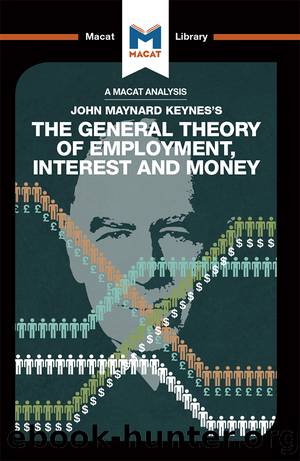An Analysis of John Maynard Keyne's the General Theory of Employment, Interest and Money by John Collins

Author:John Collins
Language: eng
Format: epub
Publisher: Macat Library
Published: 2009-08-15T00:00:00+00:00
Integration
The General Theory was the culmination of Keynesâs economic thought and philosophy. There is a clear line between his earlier work and The General Theory, which is widely considered his most substantial contribution to economics. His goal in publication was to challenge the âclassical theory of the subject, upon which I was brought up and which dominates the economic thought, both practical and theoretical, of the governing and academic classes of this generation, as it has for a hundred years past.â7
Keynesâs ideas were formed in response to the economic conditions of his time. He began to criticize the classical understanding of monetary policy in the 1920s, when he witnessed what he believed was blind adherence to the gold standard by the British government. The decision by the then Chancellor of the Exchequer Winston Churchill* to bring Britain back onto the gold standard in 1925, despite the negative impact on British industry due to the appreciation of the pound, led Keynes to publish The Economic Consequences of Mr. Churchill (1925). The title was a play on his earlier work, The Economic Consequences of the Peace, which predicted disastrous economic consequences for Europe as a direct result of the harsh treaty terms imposed on Germany in the Treaty of Versailles.* These early publications highlighted Keynesâs desire to engage directly with the key economic and political questions of his time.
Download
This site does not store any files on its server. We only index and link to content provided by other sites. Please contact the content providers to delete copyright contents if any and email us, we'll remove relevant links or contents immediately.
4 3 2 1: A Novel by Paul Auster(12392)
The handmaid's tale by Margaret Atwood(7763)
Giovanni's Room by James Baldwin(7346)
Asking the Right Questions: A Guide to Critical Thinking by M. Neil Browne & Stuart M. Keeley(5775)
Big Magic: Creative Living Beyond Fear by Elizabeth Gilbert(5771)
Ego Is the Enemy by Ryan Holiday(5448)
The Body: A Guide for Occupants by Bill Bryson(5096)
On Writing A Memoir of the Craft by Stephen King(4944)
Ken Follett - World without end by Ken Follett(4732)
Adulting by Kelly Williams Brown(4574)
Bluets by Maggie Nelson(4556)
Eat That Frog! by Brian Tracy(4540)
Guilty Pleasures by Laurell K Hamilton(4449)
The Poetry of Pablo Neruda by Pablo Neruda(4109)
Alive: The Story of the Andes Survivors by Piers Paul Read(4033)
White Noise - A Novel by Don DeLillo(4010)
Fingerprints of the Gods by Graham Hancock(4004)
The Book of Joy by Dalai Lama(3986)
The Bookshop by Penelope Fitzgerald(3853)
